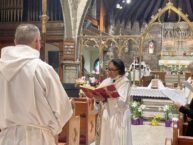 November 20, 2016: May God’s words alone be spoken, may God’s words alone be heard. Amen.
November 20, 2016: May God’s words alone be spoken, may God’s words alone be heard. Amen.
For some, this is a day called Christ the King Sunday, but the truth is, that is not a title he would have ever claimed. As we heard in the Gospel, it was a title given to him by the oppressors who crucified him. No, Jesus would not be happy with this King business I believe, Jesus is Lord is enough, and was for centuries for his followers, as Christ the King wasn’t even a thing until 1925. So, not Christ the King…but it is Advent.
Last week, I talked about our entering into the original seven week Advent, and that as a people, it seemed so appropriate to put this into practice this year, because Advent is about a people walking in darkness, but not without hope.
The people of the nation are in crisis. Many are in fear. The country is being divided against itself. Many don’t know which way to turn, how to take the next step, what to do, because the leaders have failed. Certainly this sounds like it is a time of darkness – but I am not talking about the events in this country, at least not yet. I am talking about the passage in Jeremiah we heard this morning.
If you were in doubt about whether Advent, from a lectionary point of view, is seven weeks long, just look again at our reading today from Jeremiah and the Canticle – or for Latin nerds, the Benedictus. Jeremiah begins with a stern warning from God for those in power that because they have abused their people, because they have not care for their flock, they will meet with God’s wrath. Jeremiah had been speaking about the failure of leaders in the time of the fall of Jerusalem to the Babylonians in 587 bce. And the passage ends with a very Advent-y verse “The days are surely coming, says the Lord, when I will raise up for David a righteous Branch…”
God was not happy with shepherds who fail their sheep. If that sounds a lot like Jesus who railed against those in power, you are right. One of the things that our faith, our scriptures, make abundantly clear, is that if you are going to be a leader, a shepherd, of a people, than your focus must be on them, not on your own needs or desires. And that is not easy – quite the opposite. “Taking care of sheep is a muddy, messy, smelly ministry…
[I heard a story once that]….many years ago an [Episcopal] priest was leading a tour of the Holy Land. He and his parishioners were bouncing along a lonely dirt road when their Palestinian driver slowed to a stop. A flock of sheep was blocking the road. Behind the sheep a man stood yelling and beating them with something akin to a leather whip. He was trying to make them move on ahead. Dismayed, the priest commented to the driver, “This is contrary to everything I have ever read in the Bible about a shepherd. I thought a shepherd was supposed to lead and the sheep would follow.” The …driver smiled and said, “He’s not a shepherd. He’s the butcher!”[1]The man in the story definitely did NOT have the sheep’s best interest at heart. Being a shepherd is about never forgetting that the focus of your work must always be on the welfare of the sheep. Being a leader of a people is about never forgetting that the focus your work must always be on the welfare of the people you lead. This is true, not only for those in government, but for all kinds of leadership positions – from President to parent, from CEOs to church leaders. Where we get lost as leaders is when we begin to believe that the world revolves around us.
So this passage teaches us a bit about what good leadership, being a good shepherd, looks like. Jeremiah makes it clear that in the eyes of God it requires people willing to do the hard work. It is much harder to look after the needs of your people than to do whatever it is you want – it is harder to be a shepherd than a sheep too.
We don’t have to have lived in the Ancient Near East to understand what can happen when leaders fail those they lead. We have borne witness to failed leadership in our lifetimes, and the way in which it can cause pain, fear, and division of a people. Today, we can certainly understand what it must have felt like to be a people divided, scattered, fearful of our leaders, and not sure what tomorrow will bring.
We could feel like all we want to do is pull the covers over our heads and pray that things will change. That perhaps new leaders will emerge and make everything better in some distant future. But, that would be like reading only parts of this passage from Jeremiah – the beginning condemnation of the current leaders in the first two verses, and the promise of a new leader in the final verses, when what we need most to pay attention to today is everything in between. Because if we focus only on the current predicament, and the hope of new leadership, we miss what God intends for us, and it is something so very needed now.
After condemning the current leaders, God then says “I myself will gather the remnant of my flock, and…I will raise up shepherds over them who will shepherd them, and they shall not fear any longer, or be dismayed, nor shall any be missing.” Now, ignoring the strange twist from the shepherds having dispersed the flock, to God doing that (a sermon for another day), the verses tell us what God plans for the people who are divided and abused sheep, and it has nothing to do with pulling the wool over your own eyes and going back to bed in a hope to wake up at a time when the nightmare will have ended.
God declares “I will raise up shepherds…” Guess where God gets those new shepherds? From right within the flock! God intends to work through those who once were led, to lead, and to care for the people – to be shepherds themselves.
Now one can only imagine that going from sheep to shepherd requires something of the sheep involved, right? Yes. Being a shepherd begins first with listening to God, and then following God’s call. It is about being a prophetic voice of light in the darkness. You see, there is a bit of the prophet in all shepherds, and a bit of the shepherd in all prophets. Now, speaking of prophets…
In the Canticle, Zechariah is proclaiming the joy of the birth of his son, one who will prepare the way for the people to receive the One who is to come. John, his son, will “…shine on those who dwell in darkness and the shadow of death, and to guide [their] feet into the way of peace.” That’s the work of prophets – to light the way for others. Jeremiah was not the first prophet, and John was not the last one.
Thankfully, we have had prophets throughout the centuries calling out against injustice, fighting oppression, and working for peace. Just in the past century, we can name some of them: Mahatma Gandhi, Dorothy Day, Dr. Martin Luther King, Aung San Suu Kyi, Frederick Douglas, Sojourner Truth, Nelson Mandela, Shirin Ebadi, Harvey Milk, Elizabeth Cady Stanton, Archbishop (ret.) Desmond Tutu, Wangari Maathai, William Wilberforce, Susan B. Anthony, and so many more. These are the modern day prophets and shepherds that have shown the light to those wandering in darkness, either through their words, their actions, or just standing up for their right to be who they are.
To be sure, being a prophet, a shepherd, is not about perfection – if it were, there would be none of them. As I have said before, our own book of saints – “Holy Women, Holy Men,” make clear that perfection is not the qualifier for wearing the Big S on our chest – in this case it stands for Saint – not Superman…In the preface of the book, it says, “In these saints we encounter not models of absolute perfection but men and women whose lives, with all their diversity of gifts and graces, were reshaped by God’s redemptive activity. May we take heart as we realize that, in spite of their failings and ours, we are all alike, redeemed sinners called to be saints…”
Now, there was one man in the last century, Martin Niemöller, who was anything but perfect, but more a person redeemed to do the work. He started down the wrong path, but by God’s grace, he came to see where he was wrong, and work toward justice. Martin Niemöller was a German Protestant who spent seven years in Nazi concentration camps for opposing the religious policies of Hitler. After the war he became a prominent member of the Peace Movement… [Yet], he was a controversial figure of resistance to Hitler, [because] Niemöller admitted offering to serve in the German navy in 1939. He also had limited his opposition to Hitler focusing only on protecting his church. During his time in the camp and after the war, Niemöller had time to reflect on his views and he came to [realize] he had been naive to believe in Hitler. He challenged his own anti-Semitic views and came to believe he had not done enough to speak up for other people. He admitted he was only concerned about protecting his own church and not the whole nation. This led to his famous writing, which became a symbolic message about the holocaust”[2] and also about our own complicity in these dark days of history.
“First they came for the Socialists, and I did not speak out— Because I was not a Socialist.
Then they came for the Trade Unionists, and I did not speak out– Because I was not a Trade Unionist.
Then they came for the Jews, and I did not speak out — Because I was not a Jew.
Then they came for me–and there was no one left to speak for me.”
This famous poem is a message to us all – now.
About two months ago, our own Director of Music, Bill Davies, who happens to also be a history teacher in his full-time work, gave a terrific sermon about post-WWI Germany, and the leadup to WWII. It offered a prophetic view into the darkness in which we find ourselves today – reminding us of how a people in distress listened to the strongest voice they heard – a voice promising protection, security, and prosperity to a worn nation, at the expense of some. In their desperation, of which the world was a part of bringing about, they bought into the “Big Lie” of Hitler’s propaganda machine, refusing to see what was really happening until it was too late.
Last week, in the gospel, Jesus warned his followers: “Beware that you are not led astray; for many will come in my name and say, `I am he!’ Jeremiah too was railing against false leaders. And so it would seem there were false prophets in pre-WWII Germany…and they are with us still. They call for division of the people, for scattering some of them, and promising all of this will result in good things. These are fake leaders, false prophets, because they are not interested in the common good of all, but only a few, and most especially themselves.
There are calls from among leaders of our country, and those with whom they choose to keep company, for the registry of Muslims, for conversion therapy for LGBT people, and the deportation of millions, all with the promise that this will make everything safe, secure, and better for all the people. But, caring for people can never, ever, be at the cost of abusing, neglecting, marginalizing, or oppressing others. That is not of God, but of humanity, and it is the false shepherds who lead those that follow over the cliff of violence, injustice, bigotry, and hate.
The idea that many of these shepherds call themselves Christian is not only ironic, it is unfathomable, because Jesus, the greatest shepherd of all, stood against everything they say and do. He cared for the lost, the lonely, the least, and the last – and he called us to do the same. The call of these leaders is a false one, and it has put the world on edge with fear of what is to come, but the truth of our faith is that we are not powerless in the face of darkness, not at all.
As one commentator noted, “While [Jeremiah] opens with judgment and closes with a promise of a future leader who will save and protect the people, the larger book of Jeremiah does not let us — the people — off the hook as we wait. We too must choose. […] While we live in a world where we often want to place the blame for societal ills on political leaders or larger institutions, our choices — political, economic, ideological, ecological, and more — matter. Our voices, as people, count, as does our engagement or lack of engagement with the world around us. And so while we might hope that our political leaders will “execute justice and righteousness,” in the here and now we make choices and we act — and the choices we make impact whether justice and righteousness are found in the world around us.”[3]
As shepherds and prophets, we have a lot of work to do, don’t we? Like John, we too are called to “To shine on those who dwell in darkness and the shadow of death, and to guide … [their] feet into the way of peace.” God is looking to raise up shepherds among us, and bidding us to listen to Her voice, because if we do not, if we choose to stay in the shadows, to not raise our prophetic voices, then we are no better than those false prophets and bad shepherds – that is the message of Martin Niemöller’s epic poem – and it is one we should heed wisely.
Today, each of you will bring forward your pledge cards – a commitment to stewardship of this place, out of which we bring the gospel message of hope to a world in need, and in which we are given restoration for our souls as we do this prophetic work of being shepherds in the world. These pledges are a commitment to being good shepherds and prophets, but it is only one step of many, if we are ever to live fully into who God intends us to be.
In Advent most of all, we know that in the darkest of times, the light will always come. But it is up to each of us, following where the Holy Spirit leads, to be that light, Christ’s light shining in us, to the world. To be the prophet of today, and proclaim from the highest hills, and the lowest valleys, that God loves everyone – no exceptions. To be the shepherd of a people who are lost, alone, or living in fear, that they may be restored, and open to hearing God’s call to be shepherds themselves.
We are in Advent in the church and in the world. God is looking for prophets, for shepherds, to listen, to lead, and to love. Forget looking to someone else to fix it – look in the mirror instead. You know…one of the funniest spoofs during the last several presidential campaigns had to do with who would answer the 3am phone call in the White House. There are loads of them, and they are a riot. But folks, we have our own dang 3am phone call ringing off the hook to alert us to a country and world in crisis – only this one is from a higher power than anyone who sits in the Oval Office. The question is…will we answer it?
I leave you once again, as I have before, with the blessing our bishop, the Rt. Rev. Mark Beckwith, likes to use at the conclusion of all services, from the words of the Rev. William Sloane Coffin. It speaks to our need to rise up and really see ourselves for who we are, and what we are called to do – to be good shepherds and true prophets in a time of darkness.
“May God give you the grace to never sell yourself short; grace to risk something big for something good; grace to remember that the world is too dangerous now for anything but truth, and too small for anything but love. And the blessing of God Almighty – the God who creates us; the Son who sets us free, and the Spirit who promises to be with us even to the end of the age, be with us all evermore. Amen.”
For the audio of the sermon from the 10:30am service, click here:
[1] Kari Myers. Homileticsonline.come
[2] http://www.biographyonline.net/spiritual/martin-niemoller.html
[3] Kelly J. Murphy, Asst. Professor, Central Mountain University. Workingpreacher.com
The Rev. Diana L. Wilcox
Christ Church in Bloomfield & Glen Ridge
November 20, 2016
Advent 2 (7 Week Advent) – Year C Texts
1st Reading – Jeremiah 23:1-6
Canticle 16
2nd Reading – Colossians 1:11-20
Gospel – Luke 23:33-43






